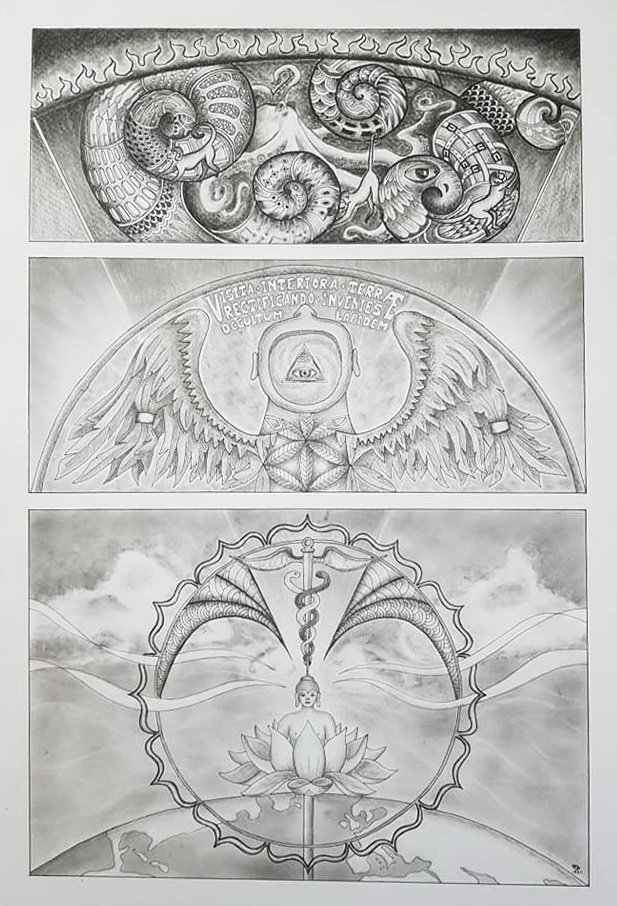-
Posts
2,502 -
Joined
-
Last visited
Content Type
Events
Forums
Downloads
Quizzes
Gallery
Blogs
Everything posted by Sunmaster
-
Out of curiosity, what made you reach the breaking point?
-
-
-
No problem, but you can still answer my last question. At least think about it.
-
And here you go on about Vedanta again. I thought I made it abundantly clear (several times now) that I'm not here to defend Advaita Vedanta. You seem terribly threatened that there might be another manual/map out there that has a much longer history than the Seth material, can back up its claims by producing some of the most enlightened souls and has a living tradition fueled by scores (millions) of practicing people. How many saints has the Seth material produced? How many have experienced bliss by reading his books? Or is the sole goal of a Sethian to "create your reality" and live a content life with good relationships, wealth, happiness in the material world? Not that there is anything wrong with that,.... if that's the only thing you're looking for. I don't know what the case is but I do know that you are heavily invested and when people are heavily invested in something, right or wrong, they tend not to let it go easily. LOL If there ever was a more blatant case of the pot calling the kettle black! 🤣 The reason I go on about it is because you've claimed that Vedanta is the same as Seth. It's clearly not. And yet you insist that it is. You say you're not an expert on Vedanta and only came to it about a year ago. You've read a few of Seth's books but not all. You've admitted than his material is convoluted - meaning you don't understand much of what you did read. I've been working with Seth's material for 44 years daily. And yet you insist that Seth's material and Vedanta are the same. I say it is not. What is it with you today? I never said they "are the same". I said they both point to a reality which is beyond human understanding (using the mind). Even in Vedanta there are different schools of thought. No problem. They all point to the same thing. They point to the same thing, but neither of them ARE the thing. It's UP TO YOU to find your own truth. Forget about Vedanta, forget about Seth. Forget about all that mind stuff. You've admitted than his material is convoluted - meaning you don't understand much of what you did read. Woa....slow down buddy. I said it's convoluted (at least some parts), not that I didn't understand it. This is what happens when you put intellectual knowledge above direct knowledge. You start to dissect the world in smaller and smaller bits in search for the life that fuels it. Why do you feel the need to defend Seth? Now that would be an interesting post.
-
Are you confusing spirituality with religion? 🤔
-
But Seth is?
-
No. Neither said nor implied (as I explained in my reply). You interpreted it that way. You created that reality. Where does it say that those complexities have to be understood on an intellectual level? Where does it say that they can't be experienced? Where is the contradiction? Well, it sure sounds like it. Again, no and I explained why. It "sounds like it" is a result of your own bias and distortion. Yes and no. The mind is a construction, a focusing tool we use to cut out a slice of infinite reality so that we may interact with the material world. Imagine a life with an unfiltered awareness, where you would be aware of light in all its bands of frequency, be aware of all sounds on the spectrum, be aware of all the thoughts and emotions around you, be aware of all the magnetic fields.....how would you be able to have a conversation with your buddies or even just feed yourself? No, our perception is limited in a way that makes physical life possible, by blocking out most of the stuff around us (or in us, for that matter). While you dive into the formless, the intellect (or maybe better call it "mind") has to be left waiting outside the door. It will be there once you come back and it will serve you even better than it did before. So the conclusion is that the intellect is geared only towards the physical world? "Insisting on using it from this point onwards is the exact opposite of what meditation is all about." Which means dispensing with it when turning your consciousness inwards. I don't know how else you can interpret that.. The mind's area of expertise is the physical (gross) and mental (subtle) world, but not for the inner worlds beyond the mind (causal). The same way you wouldn't use science to explore the inner worlds, using the mind would give you the same results. Just another empty, lifeless religion built on words instead of first-hand experience.
-
I don't see how Advaita Vedanta is prescribing anything. Unless you want to become a monk, you have full freedom to do with your life whatever you want. Sure, there are guidelines on what the most efficient ways are if your intent is going within...fasting helps cleansing the body and clearing the mind for example, eating certain types of food are more conducive than others if you want a healthy body, certain thoughts and beliefs are more beneficial than others if you seek true fulfillment. But they are all just habits that simply make sense if you choose to dedicate your life to inner discovery. If you want to be a swimming champion, you better don't eat McDonalds or go to sleep late every night. Common sense really. They are not prescribed in order to be "one of the club".
-
Well, since none of us are enlightened (yet), we are all those blind men with only a partial truth. I could say your partial truth is simply wrong because it's not the absolute truth, but I doubt you would like that. So I prefer to say that your truth is partially correct. Even though it's wrong. Mindfckery much? 😁😅
-
No! Replacement implies that you take away A and put B in its place. What I'm talking about is transcending A, so that B includes A. Very, very different.
-
Isn't learning to trust your inner self and consciously creating reality with your beliefs a way of life for you? It sure seems so. You didn't mention the intellect in this specific post, but did so previously. I claim artistic freedom for jumping from one topic to another. Deal with it. 😁
-
Sorry, I thought that was self-evident... The person who touches the belly and says it feels like a wall is correct. It does feel like a wall. His statement is correct given the limited data and context. So are all the others. Their partial truths are correct. Only a wider perspective reveals that they are only partially correct. We don't know what we don't know.
-
An issue of definition first. You use the Sethian definitions of outer self and inner self, where the inner self is a connecting point between the world (outer ego) and the vastness of the inner world. So from the outside to the inside, it goes like this (correct me if I'm wrong here): outer ego, inner ego, entity, Oversoul, AllThatIs. The Self I'm talking about is not the same as the "inner self". I use this progression: ego, self (individualized consciousness) and SELF (Absolute Consciousness). In that sense, the SELF needs nothing as it contains everything. The self however, needs to peel off ignorance to remember that it is in fact the SELF. To do that, it needs an accurate assessment of the reality it lives in.
-
And yet, all of them are simply maps of reality. A reality that has to be condensed and diluted enough to make sense for us. Can you grasp and truly know/feel what it means to be one with AllThatIs by using your intellect? Can you feel the bliss, the ecstasy of feeling the divine love flowing through your whole being by thinking about it? According to you, you should be able to. If the intellect can generate knowledge on the same level of direct experience, then this should be quite easy.
-
Replacement? Sorry, I don't follow....
-
Again, not what I said. I said they are not equal when it comes to the subjective inner world. The intellect is a tool to explore and manipulate the world for our benefit. But it's not the appropriate tool to explore the inner world, at least when used on its own without the vital input of direct experience. Nobody said anything about dispensing with the intellect or relying on direct experience exclusively. The intellect can be used in our favour though. For example by shaping new habits and routines that in turn promote direct experience. In practical terms, setting up a place and time for meditation. But once you sit down in meditation, the intellect has done its job. Insisting on using it from this point onwards is the exact opposite of what meditation is all about. The intellect is fed by thoughts and thoughts are what prevents us from "hearing the silence".
-
The intellect has it's place, just like the ego, in helping us survive as physical beings and make sense of the world that surrounds us. You used your intellect to understand and manipulate the material world around you. You succeeded in creating what you've envisioned, and this produced satisfaction and fulfilment. All these are activities of the external world. But ask yourself...who is that who used the intellect? Who is the one who created that tooling? Who experienced fulfillment? It was the Self at the root of it all. The Self that experienced all of it...the thinking, the creating, the fulfillment.
-
It's still your experience that comes a priori of the intellectual knowledge. You are not the mind. The mind is an object which makes sense of subjective data. "I have an idea." I=subject....the idea=object. You can't be the idea, because subject and object can't be the same. Same for the body. "I have a body". Same for feelings. "I feel sad." Same for memories..."I remember that one time...". Same for beliefs... "I believe in X,Y,Z.". In all these cases, there is one subject that observes the objects rising up from consciousness. Intellectual knowledge is therefore simply another (immaterial) object which is observed by the Self. How can we know the Self? Not by reading a book or thinking about it really really hard. Do you agree? Otherwise we would have scores of philosophers and clever people who have found their true identity and become not just clever, but wise sages. But then, where are all these enlightened people who reached enlightenment by thinking and analyzing? I would guess that there are none. All the sages, masters and profoundly wise people I know of, from every tradition and time period, came to that point by direct experience. Not by the way of the intellect. In fact, the intellect is the very thing that prevents direct experience. The Self can only be experienced and AFTER that, that experience can be put into concepts and words, with the all the distortions and limitations that such an act includes. This I say from my own experience and has nothing to do with Vedanta or other philosophies.
-
Or....they are all right, given the limited amount of data they have. Of course, from a wider perspective we can see that each of them only holds a partial truth.
-
Lol That doesn't answer my question though...
-
I have come to the conclusion that whatever comes out after the intellect has put it into words, is but a pale, lifeless approximation of the real thing. How do you answer it?
-
Yes, I agree. I think this is an universal truth and I don't see a conflict between our points of view.
-
I don't think I said that. What I said was that the intellect is no good at attaining real knowledge on its own. It has to be paired with direct experience. Direct experience reveals knowledge in the "form" of instantaneously recognized truth. The intellect then, to the best of its abilities, sifts through that truth and translates it into concepts and words in order to integrate the experience and make sense of it on an intellectual level. Note that, the experience or insight already made perfect sense without the intellect shaping it into words. So, the intellect is important of course, but not equal to direct experience. You can have a body of water without waves, but you can not have waves without a body of water. Direct experience is more fundamental than intellectual knowledge.
-
You say intellectual knowledge is not inferior to direct experience when it comes to subjective reality, and to support your idea, you call upon your own experience. Can you see the logical fallacy here?







